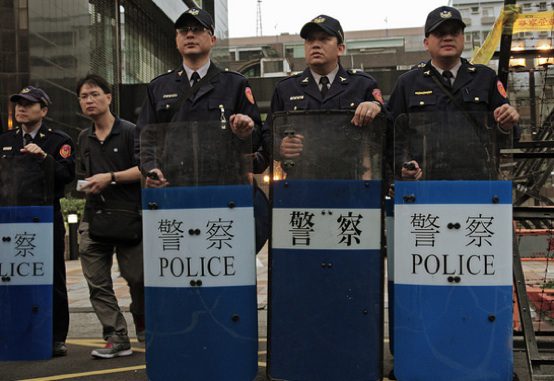Taiwan’s Protests Could Mean Trouble With China

Taiwan, the semi-autonomous nation not known for making waves, is erupting over a trade pact with China. Last week, hundreds of student protesters occupied the Legislative Yuan, Taiwan’s unicameral legislative body, demonstrating against the Guomindang’s (KMT) unilateral passage of a service trade agreement signed last year. According to CNN, protesters successfully blocked riot police from the Legislative Yuan with chairs, and have been seated both in and outside the building, singing, chanting, and holding up signs. Police have since used force to clear the Legislative Yuan, with the prime minister saying that the students were “paralyz[ing] our administrative workings,” according to a New York Times report yesterday.
The pact’s passage breaks the KMT’s promise to collaborate with the Democratic Progressive Party (DPP), staving off an inevitable conflict with the opposition over the pact. The DPP’s longtime stance is rooted in advocating full Taiwanese independence and dissolving ties with China, with much of its energy expended attacking the KMT for colluding with China against local Taiwanese interests. One of the DPP party slogans is, “sell Taiwan”, implying that the KMT is a cowardly puppet government with no interest in advocating for Taiwanese independence.
The protests come at the tail of a long decline in popular opinion of Taiwanese president Ma Ying-Jeou, whose conciliatory stance with China has incited a slow-burning resentment among his political opponents, and has even caused those within his own party to distance themselves from him. Ma’s approval ratings have dropped close to the level of disgraced former DPP prime minister Chen Sui-bian, who was convicted of money laundering in 2009.
One possible outcome of these protests, especially if the trade pact is derailed, is that formal relations across the strait could begin to deteriorate. Damon Linker in The Week speculates that if China were to take Taiwan, it would herald the end of American expansionism in the region. He argues that in spite of written agreements to help Taiwan defend itself, the United States would be unlikely to join in such a war. American neutrality in a hegemon-underdog dispute would bespeak our weakening global image as the world’s national guard, in Linker’s view. While logically sound, this perspective overlooks one important aspect of U.S.-China-Taiwan relations: The United States’s ability to influence Taiwanese relations with China or in the international community was never very strong to begin with.
Eight years before the 1979 Taiwan Relations Act that Linker cites, the United States was unable to prevent Taiwan’s expulsion from the United Nations in spite of strong objections and a counterproposal. It’s also important to remember the distinction between selling Taiwan military equipment and intervening on its behalf. It’s one thing to give your friend a knife, it’s another to come to his aid in a brawl. In the highly unlikely scenario that China invades Taiwan, the United States would be little more than a concerned bystander. It’s not a symptom of America’s weakening presence—our diplomatic ties with Japan and the Philippines are strong, as is our naval presence in the South China sea. It’s just that actively securing Taiwan is not, and never has been, a top priority for the United States.
The trade pact is a step towards maintaining good cross-strait relations, but with public opinion falling in Taiwan, and protests ongoing, further collaborations could be jeopardized. It is clear that President Ma has lost credibility in his own party, and the protests indicate that his mandate among the people is slipping. As one of the few stable and prosperous democracies in the region, this uptick in uncertainty could provide China with a rationale to exert stronger influence over Taiwan in future negotiations. Ma has two years left in his second and final term, and has lost any semblance of influence. In the years of negotiations between Taiwan and China, China has never shifted its stance on “One China”. With an ineffective leader heading up a lame-duck legislature, China might view this as an opportunity to take a more aggressive stance on Taiwan, in hopes of reeling the island back under its control.
Comments